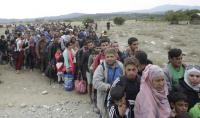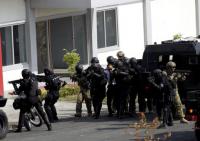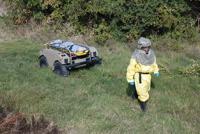-
MI6 to recruit hundreds more staff in response to advances in digital technology,
MI6, the U.K.’s overseas intelligence service, is set to recruit hundreds more digital specialists over the next four years in response to the ever-growing digital threats and challenges posed by advancing digital technology. MI6 employs 2,500 people, and the agency focuses on intelligence-gathering and operations outside the United Kingdom. MI5 is in charge of security within the United Kingdom (James Bond worked for MI6). In a rare public appearance, Alex Younger, the head of MI6, said of terrorism: “regrettably, this is an enduring issue which will certainly be with us, I believe, for our professional lifetime.”
-
-
Texas threatens to withdraw from refugee resettlement program

As part of its ongoing fight to keep Syrian refugees out of the state, Texas is threatening to withdraw from the nation’s refugee resettlement program if federal officials refuse to “unconditionally approve” a state plan requiring additional vetting of relocated people.
-
-
ISIS fired chemical shells at U.S., Iraqi troops near Mosul
U.S. defense officials say that on Tuesday ISIS has fired a shell containing mustard agent at the Qayarrah air base south of Msoul. U.S. and Iraqi troops use the base for operations against the Islamist group. No U.S. or Iraqi troops were hurt, and none has shown symptoms of exposure. One official told CNN that the agent had “low purity” and was “poorly weaponized.” A second official described it as “ineffective.”
-
-
Psychology expert: Why extremists use violence in their quest for significance

The recent attack in New York, which left 29 persons wounded, the bombings in New Jersey and the knife attack in Minnesota serve as a grim reminder that this year of blood and fury carries on. Though incomprehensible to most, these instances of seemingly rampant violence have a compelling rhyme and reason to the perpetrators. They carry out their carnage in full premeditation and after careful preparation. Theirs isn’t crime of passion, or case of temporary insanity. It is, instead, a deliberately chosen path grounded in a confidently held worldview. Based on my research, violent extremism typically requires the presence of three elements that jointly create the terrorist mindset: what I call the “N-triad of radicalization.” The three N’s are need, narrative, and network. Though it might appear random and haphazard, the violence on streets of the world’s cities is psychologically coherent. The combination of individuals’ needs, narratives, and networks forms a combustible mixture ready to explode in mayhem and murder. Taking all three elements into account may offer a reasonable, science-based approach to preventing and reversing radicalization. It may be key to interventions and programs that can stem the tide of violent extremism that seriously threatens the world’s security and stability.
-
-
TEEX Center awarded $22 million through DHS national training program

The Texas A&M Engineering Extension Service (TEEX) announced it will receive $22 million in federal funding for its National Emergency Response and Rescue Training Center (NERRTC), which provides specialized homeland security and disaster preparedness training nationwide. Since it was established in 1998, NERRTC has enhanced preparedness by training more than 560,000 emergency responders, senior officials, public works staff, and medical personnel through delivery of more than 13,000 courses to state, local, tribal, and territorial jurisdictions.
-
-
Ahmad Khan Rahami’s wife held in UAE for questioning about bomb plot
The wife of t Ahmad Khan Rahami, the man behind the bombings in New Jersey and New York, left the United States just days before the attack. The woman, whose name has not been revealed, was intercepted by United Arab Emirates authorities on Monday, where investigators are trying to determine whether she was aware of the bombing plot.
-
-
Hamas threatens Americans after State Dept. labels another leader “terrorist”
A Hamas militant issued a thinly veiled threat against Americans after the State Department officially designated a Hamas leader as being an international terrorist. The State Department’s designated Fathi Hammad as an international terrorist on Friday, saying that he used his position as a former interior minister “to coordinate terrorist cells.”
-
-
What is terrorism, and is it getting worse?
Because terrorism is so sensationalized by the media and oversimplified by authorities, it is important to demystify common misconceptions. Only then can we understand why individuals carry out political violence and put today’s acts of terrorism in historical context. Terrorism is not new. Rather it has a long history – and a historical review of terrorism activity in Western countries shows that terrorism is not worse than before the 9/11 era. The opposite is true. Western Europe, for example, has been experiencing relatively low terrorist activity during the period 2000 to 2016 compared to the period 1970 to 1995. Moreover, terrorism as a tactic does not work well. A researcher who studied 457 terrorist groups worldwide since 1968 found that terrorist groups lasted an average of eight years. No terrorist organizations studied were able to conquer a state, and 94 percent were unable to achieve even one of their strategic goals.
-
-
How Congress is failing on Zika
Three times Congress has taken up legislation to fund the continuing response to the Zika outbreak. Three times the bill, which would allocate $1.1 billion to fight the disease, has fallen short of attracting bipartisan support. While Congress delays action on Zika, the number of infected people keeps climbing. As of mid-September, there were over 3,000 reported cases in the fifty states and close to 18,000 when you count in U.S. territories like Puerto Rico and the Virgin Islands. One thing the Zika crisis has made clear is that solving emerging disease outbreaks increasingly involves navigating treacherous political waters. Congress’ lack of understanding of the real scope of voucher program – which aims to spur development of new drugs for neglected diseases — compromises efforts to find new ways of encouraging R&D in neglected diseases like Zika. Its inaction when it comes to extending funding for a major outbreak may endanger the health of thousands of Americans.
-
-
NYC terrorist captured: What we know so far
Ahmad Khan Rahami, the suspect in placing two bombs in Manhattan on Saturday – one of them exploded, injuring twenty-nine people, while the other was disarmed — has been arrested in Linden, New Jersey. He was spotted by residents sleeping in a vestibule next to a bar, and they called the police. Fire was exchanged as the police closed in on him, and two policemen, and Rahami himself, were injured, but not seriously. The Rahami family’s chicken restaurant had problems city ordinances in Elizabeth, New Jersey, and in 2011 the family sued that city and its police department for discrimination and harassment.
-
-
FBI identifies Manhattan bombs suspect as Ahmad Khan Rahami of New Jersey
The FBI has identified the suspect behind Saturday Manhattan blast – and the explosive device which was found before it exploded in another Manhattan location – as Ahmad Khan Rahami, 28 — a naturalized American living in New Jersey. He is originally from Afghanistan.
-
-
Explosive devices found in New Jersey train station
An explosive device found in a backpack near the Elizabeth, New Jersey train station exploded as a bomb squad robot tried to disarm it. The bag was discovered in a trash can at 8:30 p.m. Sunday. The blast in Manhattan, and the devices which were found in Manhattan and New Jersey before they exploded, were preceded on the same Sunday by an explosion which went off near a Marine Corps charity run in New Jersey, and the attack by a man who stabbed nine people at a Minnesota mall.
-
-
Training future problem solvers at DHS Centers of Excellence
DHS Science and Technology Directorate (S&T) says that focusing on the future does not just mean focusing on the technology, research, and development. Focusing on the future also includes the specialized research and education programs at the university-based DHS Centers of Excellence (COEs). It is this approach that has led S&T’s Office of University Programs (OUP), which manages the COEs, to offer grants, internships, and summer research experiences to help undergraduate and graduate students and recent graduates gain real-world exposure to homeland security challenges both in the field and in the lab.
-
-
Teaching the next generation of cybersecurity professionals
In 2003, I founded Cyber Security Awareness Week (CSAW) with a group of students, with the simple goal of attracting more engineering students to our cybersecurity lab at NYU. Today, with as many as 20,000 students from around the globe participating, CSAW is the largest student-run cybersecurity event in the world. The ability quickly to adapt as new threats are perceived is a top priority for security personnel. That’s a key element of all CSAW competitions – the idea that successful cybersecurity is not limited to mastering what’s known. Rather, students and professionals alike must constantly push their abilities to intercept future threats in an ever-evolving field. The competitors in the CSAW-sponsored games and competitions, which take place in educational settings in the United States and around the world, will — not long from now — be the protectors of our most sensitive personal and national data. We need them to be prepared.
-
-
Colin Powell leaked e-mail: “Israel has 200 [nukes], all targeted on Tehran”
Former secretary of state Colin Powell, in a leaked e-mail, says that Israel has 200 nuclear weapons. Powell sent the e-mail to a colleague last year, and it was obtained by the hacking group DCLeaks and published on LobeLog, a foreign policy blog. Intelligent experts, historians, and journalist trying to estimate the size of Israel’s nuclear weapons arsenal begin with estimating the size of the Dimona reactor, which went on line in 1962, and the amount of plutonium that can be extracted from the reactor’s spent uranium rods. In the literature, the number of nuclear weapons Israel is estimated to have ranges from 90-100 to 400.
-
More headlines
The long view
Factories First: Winning the Drone War Before It Starts
Wars are won by factories before they are won on the battlefield,Martin C. Feldmann writes, noting that the United States lacks the manufacturing depth for the coming drone age. Rectifying this situation “will take far more than procurement tweaks,” Feldmann writes. “It demands a national-level, wartime-scale industrial mobilization.”
No Nation Is an Island: The Dangers of Modern U.S. Isolationism
The resurgence of isolationist sentiment in American politics is understandable but misguided. While the desire to refocus on domestic renewal is justified, retreating from the world will not bring the security, prosperity, or sovereignty that its proponents promise. On the contrary, it invites instability, diminishes U.S. influence, and erodes the democratic order the U.S. helped forge.
Fragmented by Design: USAID’s Dismantling and the Future of American Foreign Aid
The Trump administration launched an aggressive restructuring of U.S. foreign aid, effectively dismantling the United States Agency for International Development (USAID). The humanitarian and geopolitical fallout of the demise of USAID includes shuttered clinics, destroyed food aid, and China’s growing influence in the global south. This new era of American soft power will determine how, and whether, the U.S. continues to lead in global development.
Water Wars: A Historic Agreement Between Mexico and US Is Ramping Up Border Tension
As climate change drives rising temperatures and changes in rainfall, Mexico and the US are in the middle of a conflict over water, putting an additional strain on their relationship. Partly due to constant droughts, Mexico has struggled to maintain its water deliveries for much of the last 25 years, deliveries to which it is obligated by a 1944 water-sharing agreement between the two countries.
How Disastrous Was the Trump-Putin Meeting?
In Alaska, Trump got played by Putin. Therefore, Steven Pifer writes, the European leaders and Zelensky have to “diplomatically offer suggestions to walk Trump back from a position that he does not appear to understand would be bad for Ukraine, bad for Europe, and bad for American interests. And they have to do so without setting off an explosion that could disrupt U.S.-Ukrainian and U.S.-European relations—all to the delight of Putin and the Kremlin.”
How Male Grievance Fuels Radicalization and Extremist Violence
Social extremism is evolving in reach and form. While traditional racial supremacy ideologies remain, contemporary movements are now often fueled by something more personal and emotionally resonant: male grievance.
